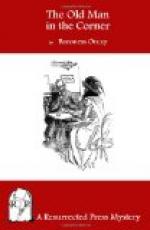“’Tremlett had told me that she seemed anxious and upset, and I went to have a chat with her; she soon cheered up and....’
“There the unfortunate young man hesitated visibly, but after a while resumed with an obvious effort.
“’She spoke of my marriage, and of the gift she was about to bestow upon me. She said the diamonds would be for my wife, and after that for my daughter, if I had one. She also complained that Mr. Macfinlay had been so punctilious about preparing the deed of gift, and that it was a great pity the L100,000 could not just pass from her hands to mine without so much fuss.
“’I stayed talking with her for about half an hour; then I left her, as she seemed ready to go to bed; but I told her maid to listen at the door in about an hour’s time.’
“There was deep silence in the court for a few moments, a silence which to me seemed almost electrical. It was as if, some time before it was uttered, the next question put by Crown Counsel to the witness had hovered in the air.
“‘You were engaged to Miss Edith Crawford at one time, were you not?’
“One felt, rather than heard, the almost inaudible ‘Yes’ which escaped from David Graham’s compressed lips.
“‘Under what circumstances was that engagement broken off?’
“Sir James Fenwick had already risen in protest, but David Graham had been the first to speak.
“‘I do not think that I need answer that question.’
“‘I will put it in a different form, then,’ said Crown Counsel urbanely—’one to which my learned friend cannot possibly take exception. Did you or did you not on October 27th receive a letter from the accused, in which she desired to be released from her promise of marriage to you?’
“Again David Graham would have refused to answer, and he certainly gave no audible reply to the learned counsel’s question; but every one in the audience there present—aye, every member of the jury and of the bar—read upon David Graham’s pale countenance and large, sorrowful eyes that ominous ‘Yes!’ which had failed to reach his trembling lips.”
CHAPTER XVI
“NON PROVEN”
“There is no doubt,” continued the man in the corner, “that what little sympathy the young girl’s terrible position had aroused in the public mind had died out the moment that David Graham left the witness-box on the second day of the trial. Whether Edith Crawford was guilty of murder or not, the callous way in which she had accepted a deformed lover, and then thrown him over, had set every one’s mind against her.
“It was Mr. Graham himself who had been the first to put the Procurator Fiscal in possession of the fact that the accused had written to David from London, breaking off her engagement. This information had, no doubt, directed the attention of the Fiscal to Miss Crawford, and the police soon brought forward the evidence which had led to her arrest.




